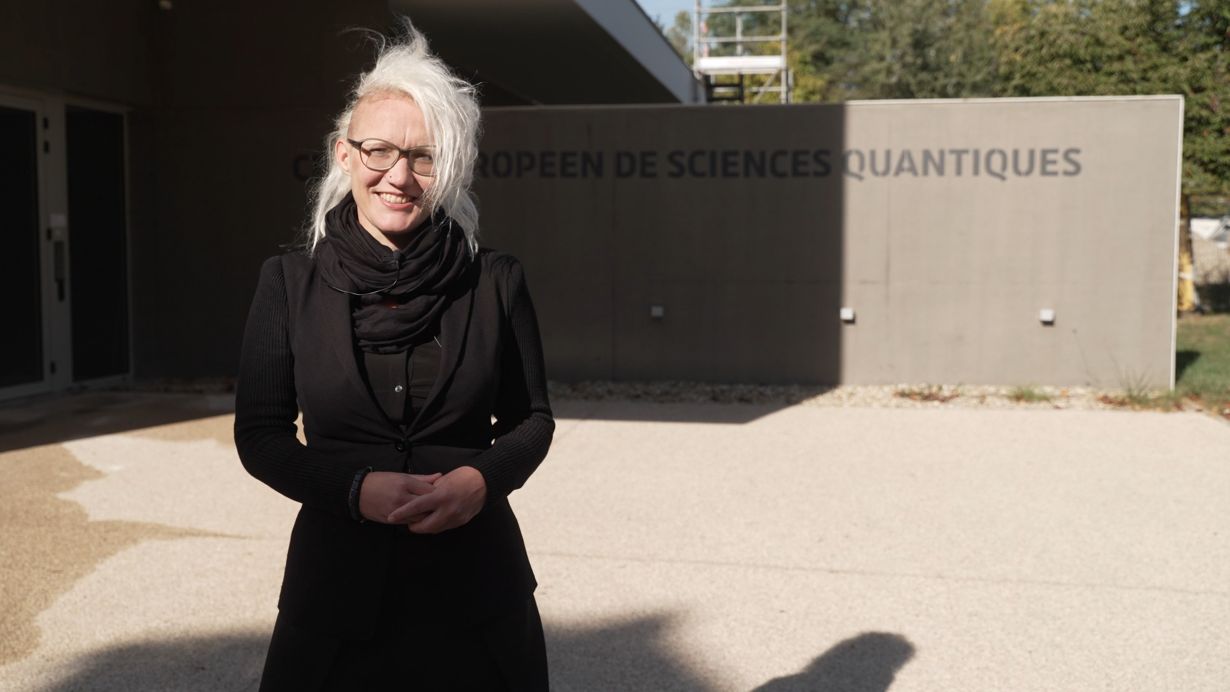
Professor Anja Metelmann of the Karlsruhe Institute of Technology (KIT) has the opportunity to teach and conduct research in quantum computing across borders with the European Confederation of Upper Rhine Universities (EUCOR). With the European Quantum Center recently inaugurated in Strasbourg as a partner institute to KIT's Institute for Quantum Materials and Technologies, Metelmann will work as a cross-border professor to expand cooperation between KIT and the University of Strasbourg. This includes research on artificial quantum systems such as superconducting circuits and electro-optomechanical systems.
"Our group's research focuses on the theory and applications of artificial quantum systems - systems whose behavior is governed by the laws of quantum mechanics. Important examples are superconducting circuits, electro-optomechanical systems and ultra-cold trapped atoms or ions," says Professor Anja Metelmann from the Institute for Theoretical Condensed Matter Physics at KIT. In addition to investigating fundamental properties, she also studies artificial quantum systems for high-precision measurements, quantum-limited information processing, and quantum computation.
The cross-border professorships have been established at the European Campus, a confederation of the universities in Basel, Freiburg, Mulhouse, Strasbourg, and KIT. They facilitate studying, teaching, and researching across national borders in the Upper Rhine region. The cross-border nature of these professorships, which are funded by Baden-Württemberg's Ministry of Science, Research, and the Arts, is thus far unique in Europe and constitutes a groundbreaking project for the European Campus. Metelmann is the first person to hold a cross-border professorship between the two EUCOR member universities in Strasbourg and Karlsruhe. In the pioneering field of quantum computing, she conducts research on quantum sciences and technology and heads a research team at the University of Strasbourg. Her professorship is also part of the 100 Professorships Program, with which KIT aims to further increase the efficiency and agility of its cutting-edge research within ten years.
Artificial Quantum Systems in a European Context
At the first German-French institute for quantum technologies, scientists like Metelmann have additional research infrastructure such as laboratories, large-scale equipment and databases at their disposal. "Besides this infrastructure, we'll also benefit from a multidisciplinary network that will reinforce the partnership between KIT and the University of Strasbourg," Metelmann says. "By bringing a lot of smart people together at the center, we'll be able to give quantum technology research a boost and speed up the transition from theory to practical applications."
"In many years of cooperation with our EUCOR partners and other scientific institutions in the Trinational Upper Rhine Metropolitan Region, we've been able to establish a unique research environment. Now the European Quantum Center provides a new way to drive international cooperation in the development of groundbreaking applications for quantum technology, and it puts EUCOR in a strong position with respect to our European competitors," says Professor Thomas Hirth, Vice President Transfer and International Affairs at KIT and Vice President of EUCOR.
About EUCOR - The European Campus
EUCOR - The European Campus is a three-nation association of five universities in the Upper Rhine region. In addition to the Karlsruhe Institute of Technology (KIT), it includes the universities of Basel, Freiburg, Haute-Alsace and Strasbourg. The universities pool the expertise of 15,000 researchers, 13,500 doctoral students, and 117,000 students in a region of vibrant scientific and economic activity across parts of France, Germany and Switzerland. EUCOR aims to establish a high-profile region of scientific research with an international reputation.
More information (in French): https://fondation.unistra.fr/projet/centre-europeen-sciences-quantiques/
Being "The Research University in the Helmholtz Association", KIT creates and imparts knowledge for the society and the environment. It is the objective to make significant contributions to the global challenges in the fields of energy, mobility, and information. For this, about 9,800 employees cooperate in a broad range of disciplines in natural sciences, engineering sciences, economics, and the humanities and social sciences. KIT prepares its 22,300 students for responsible tasks in society, industry, and science by offering research-based study programs. Innovation efforts at KIT build a bridge between important scientific findings and their application for the benefit of society, economic prosperity, and the preservation of our natural basis of life. KIT is one of the German universities of excellence.






